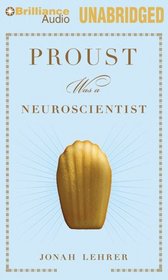Helpful Score: 2
I decided to read this book, simply because it had an interesting title. Fortunately, that decision turned me on to reading this book. Jonah Lehrer has composed an extremely well written, and easy for the layman to understand, treatise on the modern science of the brain.
Lehrer organized this book around well known or moderately well known historical personalities who "discovered truths about the human mind" well in advance of the modern scientific understanding of these same truths. Eight "artists" (writers, painters, musicians, and even a cook) are utilized to explain concepts regarding the operation of our brains. Walt Whitman, George Eliot, Auguste Escoffier, Marcel Proust (hence the title of the book), Paul Cezanne, Igor Stravinsky, Gertrude Stein, and Virginia Woolf give insights (at least according to Mr. Lehrer) through particular works of their individual arts.
Lehrer is particularly adept at explaining the concepts of neuroscience utilizing easy to grasp historical "works", such as a Cezanne painting. I was amazed, not having a great deal of background in neuroscience, at how easily he could boil a difficult concept down to its component parts simply by looking at a work of art or a musical composition. This is probably because Mr. Lehrer himself was a graduate student in neuroscience before deciding to pursue a career in writing. It is not often that a scientist is able to present their concepts in a deft enough fashion that someone with a non-scientific background can follow. Mr. Lehrer has this gift.
I would highly recommend the chapters on Escoffier, Proust, Cezanne, and Stravinsky (ch. 3-6). Unfortunately, the last two chapters of this book were not quite as well stated, so Proust was a Neuroscientist ended on a bit of a low note for me. With that being said, I believe this book is a entertaining and enlightening read, and would heartily endorse it's information to you!
Lehrer organized this book around well known or moderately well known historical personalities who "discovered truths about the human mind" well in advance of the modern scientific understanding of these same truths. Eight "artists" (writers, painters, musicians, and even a cook) are utilized to explain concepts regarding the operation of our brains. Walt Whitman, George Eliot, Auguste Escoffier, Marcel Proust (hence the title of the book), Paul Cezanne, Igor Stravinsky, Gertrude Stein, and Virginia Woolf give insights (at least according to Mr. Lehrer) through particular works of their individual arts.
Lehrer is particularly adept at explaining the concepts of neuroscience utilizing easy to grasp historical "works", such as a Cezanne painting. I was amazed, not having a great deal of background in neuroscience, at how easily he could boil a difficult concept down to its component parts simply by looking at a work of art or a musical composition. This is probably because Mr. Lehrer himself was a graduate student in neuroscience before deciding to pursue a career in writing. It is not often that a scientist is able to present their concepts in a deft enough fashion that someone with a non-scientific background can follow. Mr. Lehrer has this gift.
I would highly recommend the chapters on Escoffier, Proust, Cezanne, and Stravinsky (ch. 3-6). Unfortunately, the last two chapters of this book were not quite as well stated, so Proust was a Neuroscientist ended on a bit of a low note for me. With that being said, I believe this book is a entertaining and enlightening read, and would heartily endorse it's information to you!




